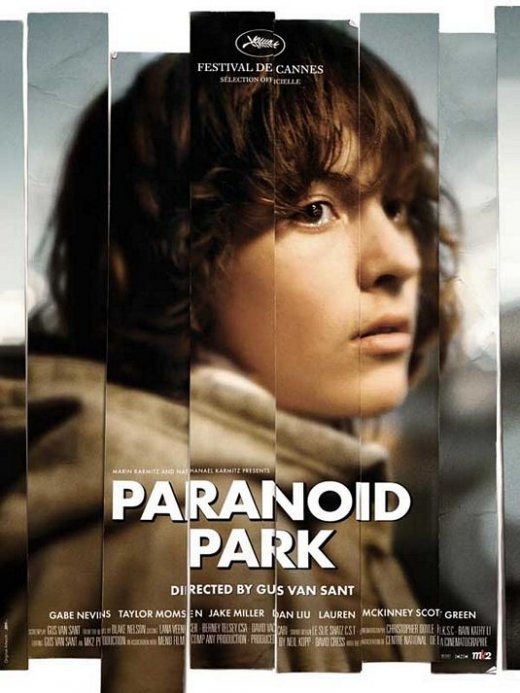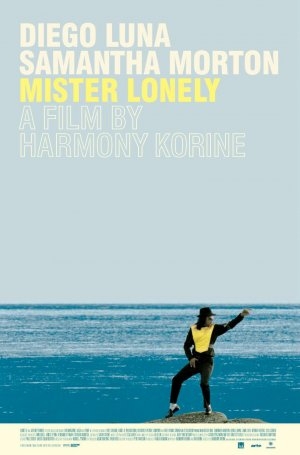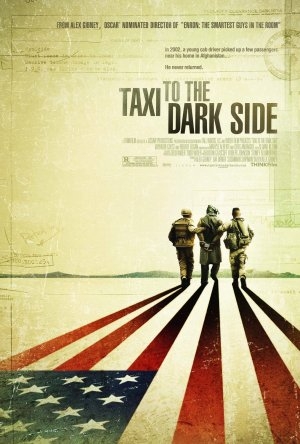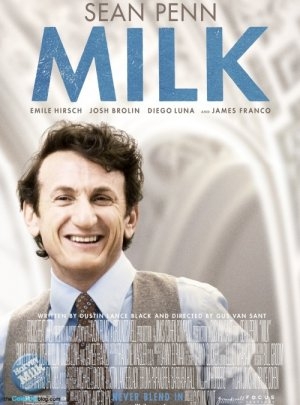
 BY DAN BUSKIRK Looking over this list of favorite film experiences of the last year I’m stuck on the idea that my recommendations might be misleading. Particularly with Harmony Korine’s Mister Lonely and with both the Van Sant films, the power of the experiences seem especially diminished by their transition from theater event to home video. Watching Diego’s Luna’s Michael Jackson impersonator break-out his best Jacko moves in front of a Paris skyline in the opening of Mister Lonely or Christopher Doyle’s breathless camerawork in Paranoid Park were visceral experiences in the theater. At home, what can I say: results may very. Let’s hope this latest economic downturn does not speed the growing trend of video projection in mainstream theaters; it’s hard for a film fan to see the quality of the medium’s very image be cheapened for mere expediency. Anyway here’s a list of films from this year that kept me confounded long after the projector bulb dimmed.
BY DAN BUSKIRK Looking over this list of favorite film experiences of the last year I’m stuck on the idea that my recommendations might be misleading. Particularly with Harmony Korine’s Mister Lonely and with both the Van Sant films, the power of the experiences seem especially diminished by their transition from theater event to home video. Watching Diego’s Luna’s Michael Jackson impersonator break-out his best Jacko moves in front of a Paris skyline in the opening of Mister Lonely or Christopher Doyle’s breathless camerawork in Paranoid Park were visceral experiences in the theater. At home, what can I say: results may very. Let’s hope this latest economic downturn does not speed the growing trend of video projection in mainstream theaters; it’s hard for a film fan to see the quality of the medium’s very image be cheapened for mere expediency. Anyway here’s a list of films from this year that kept me confounded long after the projector bulb dimmed.
Mister Lonely marks the return to feature film making of Harmony Korine after nearly a decade away and it shows the provocateur behind Gummo expanding his skills as a wily wrangler emotional ambivalence and morbid spectacle. It’s a film that could only be made by Korine and it is his most ambitious and visually audacious story yet. In an isolated European commune, a group of people dressed as the icons of Western Civilization (you know, The Pope, The Queen, The Three Stooges and others) try to find a way to live together. We follow the path of a shy Michael Jackson impersonator (Diego Luna, the suicidal boyfriend in Milk) as he joins the group and becomes enmeshed in the violent relationship between Marilyn Monroe (a super-fragile Samantha Morton) and Charlie Chaplin (Denis Lavant). “Personal” is an adjective that gets thrown around frequently, but Korine’s sad little goofball poem is exactly that, a film that shuns genre conventions and constantly defies our expectations to such extremes that it demands a personal response from those willing to acquiesce to its journey. That said, in comparison to the Korine-scripted teen scare classic Kids and the white trash absurdism of Gummo, Mister Lonely is his most gentle and generous work. How exciting it is that the stubbornly original Korine has emerged from the ether to continue to cobbling together his increasingly rich filmography, I feared he was lost.
Another stubborn dreamer gets his day in the sun in the Audience award winner of the 2008 Philadelphia Film  Festival, Jeremiah Zagar’s In a Dream. This very immediate documentary introduces us to the patriarch of director’s family, the Philadelphia mosaic artist Isaiah Zagar. Zagar’s history of mental health is illuminated by his body of work and through a lifetime of artist notebooks and murals we begin to decode the imagery of his work. Throw in some stark domestic discord and you have one of the most emotionally detailed and honest films about an American Family that we’ve seen this year. Reportedly shortlisted for a Best Documentary Oscar nod this year.
Festival, Jeremiah Zagar’s In a Dream. This very immediate documentary introduces us to the patriarch of director’s family, the Philadelphia mosaic artist Isaiah Zagar. Zagar’s history of mental health is illuminated by his body of work and through a lifetime of artist notebooks and murals we begin to decode the imagery of his work. Throw in some stark domestic discord and you have one of the most emotionally detailed and honest films about an American Family that we’ve seen this year. Reportedly shortlisted for a Best Documentary Oscar nod this year.
“I’m not a killer, I’m a Christian” pleads Victoria (Aunjanue Ellis) in the torrid religious potboiler Cover. Pity her as she slides down a spiritual hellhole worthy of Lana Turner right in the heart of Center City Philadelphia! Patti Labelle is part of a huge and capable African American cast that includes Oscar Winner Louis Gossett Jr and Curb Your Enthusiasm‘s Vivica Fox. They are part of a local religious community rife with husbands stepping out on their wives in “the gay way”! Panic, hysteria and murder ensues, along with a breezy tour of all the local sights. Jaw-dropping, any way you look at it, but irresistible for anyone game for an updating of Douglas Sirk-style Fifties melodramatics.
I’m in agreement in the chorus of critics hailing Gus Van Sant’s Milk, Penn’s performance is the product of a rare talent getting a role with the sort of scope and gravitas that suits him. Van Sant’s recent string of quiet, expressionist films inform Milk and its very nuanced and lively sense of atmosphere to the San Francisco of the 70’s. The best of Van Sant’s more experimental works was released this year as well and it would be a shame to overlook Paranoid Park, a film every bit as masterful as Milk. Shot by Wong Kar Wai cameraman Christopher Doyle, this hallucinogenic drift through a traumatized skater’s life transforms teenhood into a bubble of mundane beauty. Doyle’s work is what made the Ashes of Time reissue so exciting earlier last fall and his blue and luminous work in Paranoid Park begs to be dismantled and installed in a gallery somewhere.
 Paranoid Park‘s visual beauty was matched by the moral ugliness on display in two of this year’s documentaries: Errol Morris’ Standard Operating Procedure and Alex Gibney’s Oscar-winning U.S. military torture doc Taxi To The Dark Side. With the way their stories and issues of torture have run together in my mind, it seemed unfair to mention one without the other. When he featured Robert McNamera in 2003’s Fog Of War Morris graduated from interviewing common schnucks to real policy makers. Morris continues with some real stars here too: they’re the participants of the Abu Ghraib torture photos. Their grins (mostly) off their faces and some showing signs of post-traumatic stress, they paint one picture of what was going on before and after those infamous photos were being shot. Yet the shrugging dismissals of their culpability and their basically aggrieved manner paints a pretty grim pictures of coarsened humanity. Of course this is Errol Morris and through his “interrotron” we can look Lynndie England right in the eye, giving the audience a real “heart of darkness” experience. TAXI TO THE DARK SIDE tells the story of a cab driver who got pulled in on an Army dragnet in Afghanistan. Everyone knew he wasn’t guilty of anything but he screamed “Allah” in a way the soldiers found humorous so they jumped on his thighs until they became what was officially described as “pulverized” in medical reports. The Prisoner’s death is traced up the chain of command to a President who famously proclaimed his cluelessness to what “outrages upon human dignity” might even mean, a fact that gives both films a real political urgency as we decide how to address these crimes under a new administration.
Paranoid Park‘s visual beauty was matched by the moral ugliness on display in two of this year’s documentaries: Errol Morris’ Standard Operating Procedure and Alex Gibney’s Oscar-winning U.S. military torture doc Taxi To The Dark Side. With the way their stories and issues of torture have run together in my mind, it seemed unfair to mention one without the other. When he featured Robert McNamera in 2003’s Fog Of War Morris graduated from interviewing common schnucks to real policy makers. Morris continues with some real stars here too: they’re the participants of the Abu Ghraib torture photos. Their grins (mostly) off their faces and some showing signs of post-traumatic stress, they paint one picture of what was going on before and after those infamous photos were being shot. Yet the shrugging dismissals of their culpability and their basically aggrieved manner paints a pretty grim pictures of coarsened humanity. Of course this is Errol Morris and through his “interrotron” we can look Lynndie England right in the eye, giving the audience a real “heart of darkness” experience. TAXI TO THE DARK SIDE tells the story of a cab driver who got pulled in on an Army dragnet in Afghanistan. Everyone knew he wasn’t guilty of anything but he screamed “Allah” in a way the soldiers found humorous so they jumped on his thighs until they became what was officially described as “pulverized” in medical reports. The Prisoner’s death is traced up the chain of command to a President who famously proclaimed his cluelessness to what “outrages upon human dignity” might even mean, a fact that gives both films a real political urgency as we decide how to address these crimes under a new administration.
As those two films hash over current policy (in a more rigorous manner than most our newsrooms I might add) Russian director Aleksandr Sokurov delivered a more timeless comment on war, Alexandra. Opera singer Galina Vishevskaya plays the title character, an indefatigable Russian grandmother going to the front to visit her soldier grandson. Sokurov quietly eavesdrops on their reunion in the barren outpost and everyone the grandmother runs into, no matter which side of the conflict they are on, treat this stubborn lady with the deference she silently demands.
Two small scale films round out the list, Barry Jenkins’ Medicine For Melancholy (set to run on IFC in February ’09) is a particularly fluent first feature whose unique voice elevates it above its thin Before Sunrise-like plot. After a Saturday night pick-up, a young couple (an excellent Wyatt Cenac of the Daily Show & Tracey Heggins) spend their Sunday rolling around San Francisco figuring out what they think of themselves and each other. Writer/director Jenkins brings a picture of educated young African Americans that underlines a perspective so often lost in American film yet his thoughtful and relaxed film has race and million other things on its mind as well and Medicine continually finds poetic and provocative ways to state them. Chris Smith’s The Pool found the director of the documentary American Movie turning his eye to a fictional story set in a far off (and yet not so distant) rural India. Describing the details of this story of an uneducated handyman and his fleeting relationship with his mansion-owning employers won’t capture the quiet strength of the filmmaking Smith achieves. Nothing in the narrative would shock or surprise and yet Smith ability of ferret out the details of their existence without pretension invests a near spiritual gravity in everyday rituals. Smith is a director who has worked quietly below any hype but he is slowly plotting a trajectory with both fictional and documentary films that would lead you to expect that he has decades of first-class work in front of him.
’09) is a particularly fluent first feature whose unique voice elevates it above its thin Before Sunrise-like plot. After a Saturday night pick-up, a young couple (an excellent Wyatt Cenac of the Daily Show & Tracey Heggins) spend their Sunday rolling around San Francisco figuring out what they think of themselves and each other. Writer/director Jenkins brings a picture of educated young African Americans that underlines a perspective so often lost in American film yet his thoughtful and relaxed film has race and million other things on its mind as well and Medicine continually finds poetic and provocative ways to state them. Chris Smith’s The Pool found the director of the documentary American Movie turning his eye to a fictional story set in a far off (and yet not so distant) rural India. Describing the details of this story of an uneducated handyman and his fleeting relationship with his mansion-owning employers won’t capture the quiet strength of the filmmaking Smith achieves. Nothing in the narrative would shock or surprise and yet Smith ability of ferret out the details of their existence without pretension invests a near spiritual gravity in everyday rituals. Smith is a director who has worked quietly below any hype but he is slowly plotting a trajectory with both fictional and documentary films that would lead you to expect that he has decades of first-class work in front of him.
I’d feel remiss if I didn’t mention a particularly welcome DVD release of ’08, Wendell B. Harris’ 1989 Sundance Award winning film Chameleon Street. Based on the true story of Douglas Street, Harris’ debut is a black comedy about an African American con man who successfully passes himself off as everything from a sports journalist to a Harvard-trained intern. My god, the scene where has performs a hysterectomy should be a acknowledged cinema classic by now. Chameleon Street is a positively Welles-like film (and not-in-the-least because of the directors intelligently cool performance in the lead), bursting with love of art, cinema and a sly joke and the twenty years that have past have only sharpened its insights. Sadly, the Welles references would prove doubly-fitting and Harris’ story became somewhat famous among indie filmmakers. Fresh from winning the Grand Jury Prize at Sundance, he received meetings with every major producer in Hollywood but no one wanted to make another film with him. Unlike Welles, Harris didn’t go on to make European cheapies and wine commercials. Instead he hasn’t made a film since, leaving this very black Citizen Kane-inspired masterpiece as his only work.
I can’t abide by the certainty in which some film writers accredit to their lists, ask me in a week and I’m sure I might describe any other these as being among the Best of ’08: the Romanian abortion horror film 4 Months, 3 Weeks and 2 Days, Turkish director Fatih Akin’s circular romantic tragedy Edge of Heaven, the Swedish youth vampire film Let the Right One in (a surprise hit locally), Asia Argento weaving her spell in Catherine Breillat’s The Last Mistress, the Los Angeles 1950’s Indian ghetto film The Exiles. Fernando (City Of God) Meirelles’ all too believable societal collapse in Blindness, and the documentary of free jazz shaman My Name Is Albert Ayler. I appreciated how much great cinema we get a chance to see here in Philadelphia after talking to a friend in Lancaster recently, where folks rarely get a chance to see such wonders projected on screen. So don’t wait for video, visit your local theater soon!
